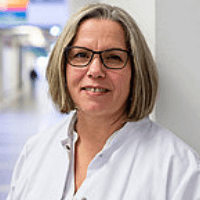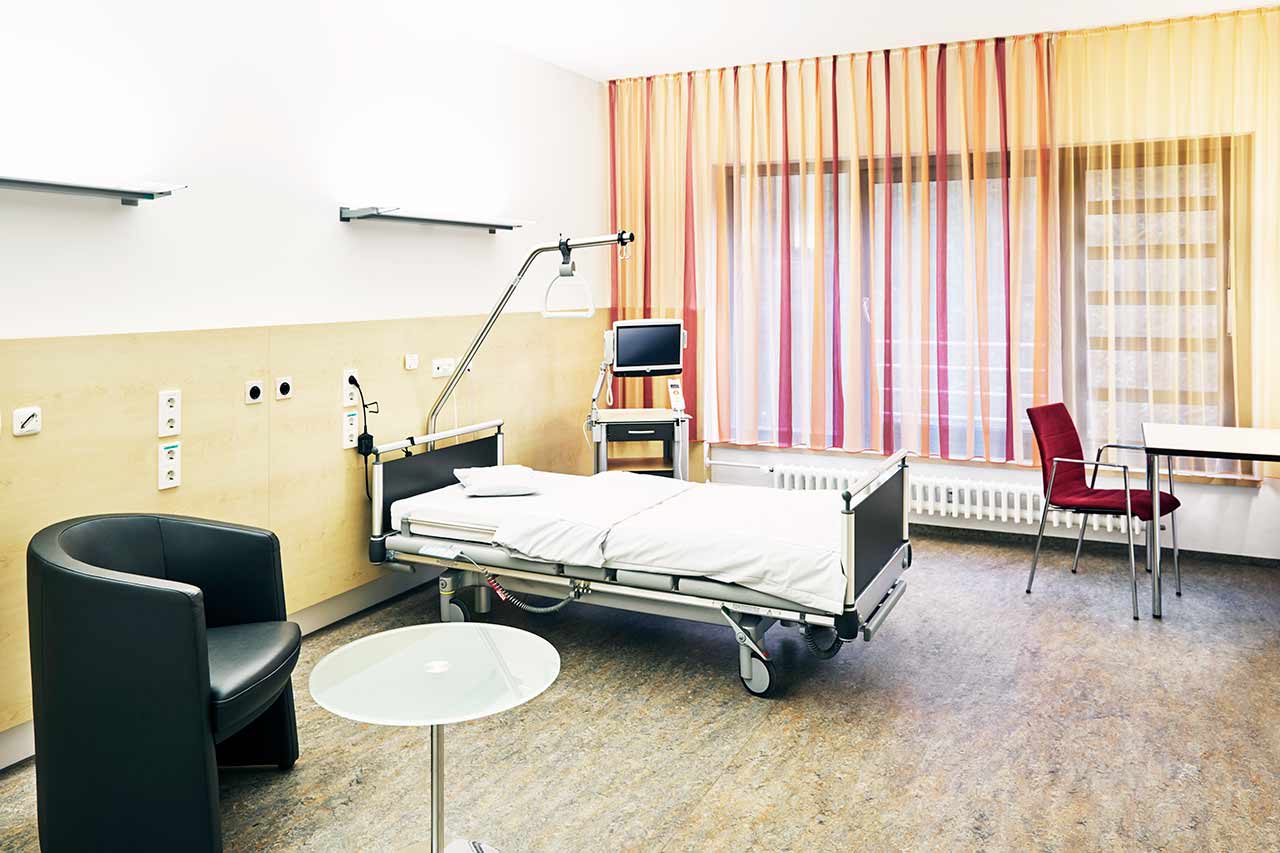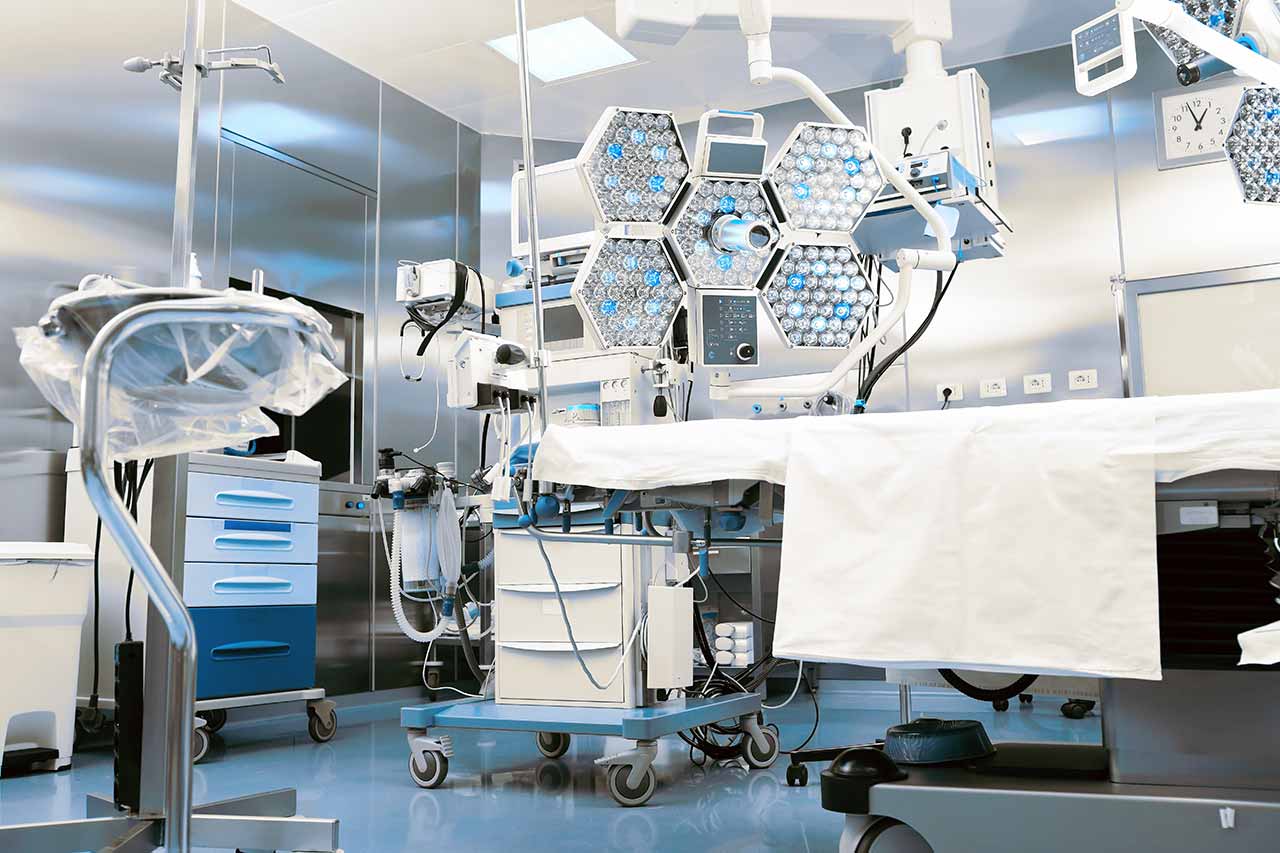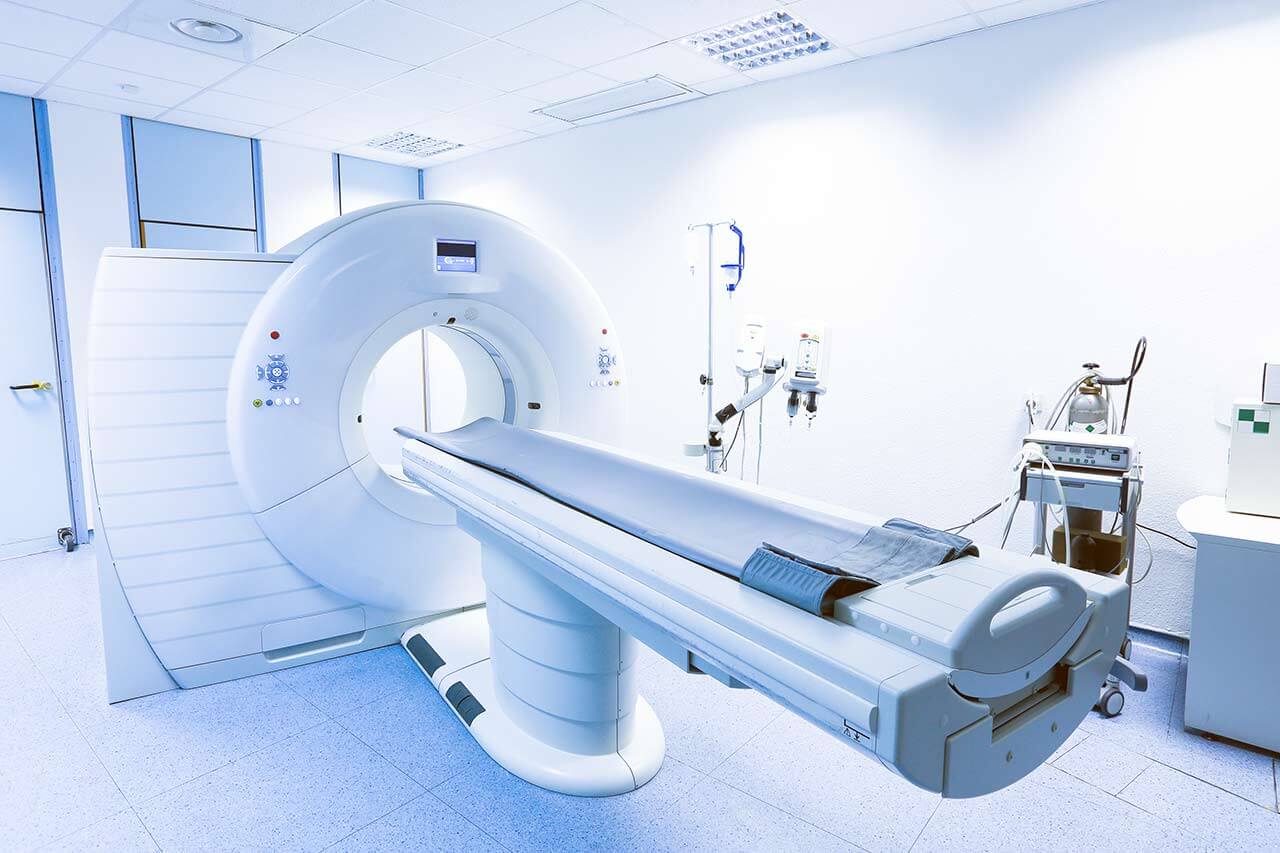
The program includes:
- Initial presentation in the clinic
- clinical history taking
- review of medical records
- physical examination
- laboratory tests:
- complete blood count
- biochemical blood analysis
- inflammation indicators (CRP, ESR)
- indicators of blood coagulation
- TSH-basal
- blood gas analysis
- antinuclear antibodies (ANA)
- rheumatoid factor titers (RF)
- chest x-ray examination
- bronchography
- high-resolution computed tomography (HRCT)
- collected three sputum samples
- pulmonary function test
- bronchoscopy
- bronchial lavage
- nursing services
- consultation of related specialists
- development of individual treatment plan
Required documents
- Medical records
- Chest X-ray, MRI/CT scan (if available)
Service
You may also book:
 BookingHealth Price from:
BookingHealth Price from:
About the department
The Department of Diagnostic and Interventional Pulmonology at the Hospital Kassel offers the full range of modern medical services for patients with diseases of the respiratory tract, lungs, pleura, including allergic and malignant diseases, as well as extrapulmonary diseases affecting the lungs. The department's specialists are proud of their successful experience in the treatment of lung and pleural cancer, obstructive airway diseases, infectious diseases of the lungs and pleura, pulmonary fibrosis. In addition, the department’s competence includes obstructive sleep apnea screening using polygraphy. The department also provides emergency care for patients with breathing disorders and life-threatening respiratory diseases. The team of the department's pulmonologists applies all their professionalism and rich clinical experience to provide their patients with the high-quality medical care of the European standard. The Chief Physician of the department is Dr. med. Sigrid Verlaan.
The department has advanced equipment for effective diagnostic and therapeutic bronchoscopy, which plays an important role in detecting many diseases of the respiratory tract, eliminating obstructive processes and internal bleeding in the respiratory tract. In addition to high-quality drug therapy for various diseases of the respiratory tract and lungs, the department's specialists carry out long-term oxygen therapy and non-invasive ventilation. Such treatment methods are most often required for patients with respiratory distress. Once the patient's condition has been normalized, he may be additionally appointed home mechanical ventilation.
The department quite often admits patients with lung cancer. This disease is one of the most complex, while its treatment requires a comprehensive and interdisciplinary approach. Each patient with lung cancer is provided with an individual treatment regimen developed at the tumor boards with the participation of not only pulmonologists, but also oncologists, chemotherapists, radiation therapists, radiologists, thoracic surgeons, etc. When developing treatment tactics, the decisive factors are the type of tumor and its stage, the presence of metastases, the age of the patient and his general state of health. Depending on the particular clinical indications, the treatment may involve such techniques as surgical resection of the tumor (in collaboration with thoracic surgeons), chemotherapy, radiation therapy, targeted therapy, immunotherapy and others.
The department specializes in the treatment of the following diseases of the lungs and respiratory tract:
- Oncological diseases
- Lung cancer
- Pleural cancer
- Obstructive airway diseases
- Bronchial asthma
- Chronic obstructive pulmonary disease
- Infectious diseases of the lungs and pleura
- Interstitial lung disease (focus on lung fibrosis treatment)
- Lung diseases causing respiratory distress and emergency conditions
- Other pulmonary diseases
The range of the department's diagnostic and therapeutic services includes:
- Diagnostics, including interventional procedures
- Pulmonary function testing (for example, plethysmography, assessment of the diffusion capacity of the lungs, spiroergometry)
- Chest ultrasound scanning
- Bronchoscopy for diagnostic purposes
- Obstructive sleep apnea screening using polygraphy
- Biopsy for suspected lung cancer, pleural cancer
- Pleural puncture for diagnostic purposes
- Treatment, including interventional procedures
- Drug therapy using the very latest drugs
- Long-term oxygen therapy
- Non-invasive ventilation
- Home mechanical ventilation
- Intensive care in critical conditions
- Interventional therapeutic procedures
- Treatment of airway obstruction
- Treatment of pulmonary bleeding
- Pleural puncture for therapeutic purposes in the case of pleural effusion
- Other diagnostic and therapeutic options
Curriculum vitae
Dr. med. Sigrid Verlaan heads the Department of Diagnostic and Interventional Pulmonology at the Hospital Kassel. She received her Medical Degree at the Faculty of Medicine of the Philipps University of Marburg. After receiving her doctorate, Dr. Verlaan worked in various hospitals in Kassel, where she had professional training in her area of her specialization, and since 2004 she has been working as Senior Physician in the Department of Internal Medicine. In this position, Dr. Verlaan created the Home Ventilation Centre and also headed the Sleep Laboratory, the Intensive Care Unit and the Weaning Unit. Dr. Sigrid Verlaan is not only a certified pulmonologist, but also has additional qualifications in palliative care, somnology and emergency medicine.
Photo of the doctor: (c) Klinikum Kassel
About hospital
The Hospital Kassel is a progressive medical facility with a huge medical team, which provides high-quality medical services in all branches of modern medicine. The hospital is part of the regional medical Gesundheit Nordhessen Holding, which unites 5 top-class medical centers, including specialized rehabilitation clinics. With 1,281 beds, the hospital is known as the largest medical complex in the federal state of Hesse. The hospital has 32 specialized departments with highly qualified doctors and specially trained nursing staff in each department. The team of 3,200 employees takes care of the health of patients. The main value for each employee is the patient's health. The professional skills of the medical staff in combination with state-of-the-art medical and technical equipment of the hospital provide excellent opportunities for the treatment of patients with pathologies of any severity.
The hospital provides treatment to over 55,000 inpatients and about 140,000 outpatients every year. Medical care is provided to both German citizens and many patients from foreign countries. Such high rates are the evidence of excellent quality of medical services and the high credit of patients' trust.
The hospital has created a wonderful atmosphere, which contributes to the rapid recovery of patients. All diagnostic and therapeutic rooms, operating rooms, as well as patient rooms are designed taking into account modern standards of European medicine in order to ensure maximum comfort of each patient. All employees working in the hospital provide the patient with understanding and respect, as well as support him in every possible way during the entire therapeutic process.
The hospital successfully implements a quality management system. It uses its own quality management system implemented by the medical Gesundheit Nordhessen Holding, as well as the IQM (Initiative Qualitätsmedizin) monitoring system. As part of healthcare quality management, the hospital annually clearly provides reports on its clinical activities, the success of diagnostics, treatment, level of patient care, etc. Thus, the hospital stands for maximum openness in its work and makes every effort to maintain the highest level of quality of medical care.
Photo: (с) depositphotos
Accommodation in hospital
Patients rooms
The patients of the Hospital Kassel live in comfortable single, double and triple rooms. The patient rooms are made in a modern design and pastel colors. A standard patient room includes an automatically adjustable bed, a bedside table, a wardrobe, a table and chairs for receiving visitors, a TV and a telephone. The patient rooms have Wi-Fi. Each room has an ensuite bathroom with shower and toilet.
The hospital also offers enhanced-comfort patient rooms. Most of these rooms have a balcony. The bathroom additionally includes a hairdryer, towels and toiletries.
Meals and Menus
The patient and the accompanying person are offered tasty and balanced three meals a day. If for some reason you do not eat all foods, you will be offered an individual menu. Please inform the medical staff about your food preferences prior to treatment. The patients staying in enhanced-comfort rooms are provided with an individual menu every day.
The hospital also has several cafes where one can have a cup of tea or coffee, taste delicious pastries, salads, main hot dishes, pizza, etc.
Further details
Standard rooms include:
Religion
The religious services are available upon request.
Accompanying person
During the inpatient program, the accompanying person can live with the patient in a patient room or a hotel of his choice. Our managers will help you choose the most suitable option.
Hotel
During an outpatient program, the patient can stay at the hotel of his choice. Our managers will help you choose the most suitable option.





